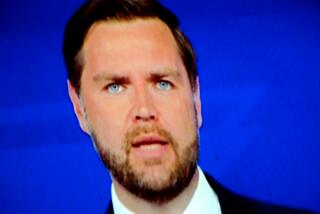VP wanted: No future presidents, please
- Share via
Vice presidents once were little more than Senate chairs and presidential spares. Then they became presumptive heirs, favored candidates for their party’s presidential nomination. George W. Bush broke that pattern by picking a running mate with a great resume but no wish to run eight years later. John McCain and Barack Obama would be wise to do the same.
Originally, the runner-up in the vote for president became vice president, the first two being John Adams and Thomas Jefferson. But in 1804, the rules changed: Vice presidents would be separately elected. By then, political parties had formed. They preempted vice presidential leadership of the Senate and began pairing presidential candidates with far less eminent running mates, chosen for regional balance.
A small role became a black hole. While the president lived, the vice president was not seen or heard except to break rare tie votes in the Senate. In 150 years, only one sitting vice president -- Martin Van Buren -- was elected president, and of the seven who succeeded to the office on the death of a president, only three were later elected, or even nominated.
It was President Eisenhower who amplified the office by making Vice President Richard Nixon an active spokesman, chairman of executive councils, diplomatic stand-in and, in effect, head of government while Ike recovered from a heart attack. All of that helped the young, ambitious Nixon win his party’s nomination for president.
The pattern was set. The vice presidential nomination came to be seen as the anointment of an electoral successor.
From 1960 to 2000, four presidents retired and were succeeded by their vice presidents as party nominee. Three other presidents ran for reelection and lost, but their running mates all sought the nomination later, and two got it.
Despite the Bush/Cheney exception, the pattern is now so ingrained that if McCain or Obama puts a plausible electoral successor on the ticket, he will have partly rigged the 2016 election, loading it like a bad pair of dice.
No one is smart enough to choose the best candidate for president eight years in advance. The vice presidency, moreover, while not the black hole it once was, still is no match for gubernatorial, congressional or Cabinet experience as a warm-up for the presidency: Vice presidents do not have to plan or persuade, lead or decide. Besides, a vice president running for president confounds the choice between candidates with a referendum on the outgoing administration. And any anointed successor running for vice president confounds today’s presidential choice with another one eight years off.
A better running mate is a distinguished elder statesman eminently qualified to assume the presidency but too old to run in eight years.
An obvious choice for McCain is North Carolina Sen. Elizabeth Dole. She is uncommonly well-educated (Duke, Oxford, Harvard), a former federal trade commissioner, secretary of Transportation, secretary of Labor and president of the Red Cross. And, like McCain, she was a candidate for the 2000 presidential nomination. Born in 1936, Dole is too old to run in 2016 but is manifestly qualified to jump into the Oval Office if need be and land on her feet. She is up for reelection to the Senate this year, but North Carolina can let her run for both jobs.
For Obama, an obvious choice is Bob Graham, also born in 1936. The former Florida governor and U.S. senator (and more recently a professor at Harvard) is a renowned expert on intelligence policy and a marvelously articulate speaker. His own 2004 presidential bid fizzled, but in part for a commendable reason: Unlike John Kerry and Howard Dean, Graham unequivocally opposed the Iraq war all along.
More often mentioned as a running mate for Obama, former Sen. Sam Nunn of Georgia resembles Graham in age (69), region and national security expertise. But Nunn lacks Graham’s charisma and breadth of experience, and although he too opposed a war, it was the wrong one: He opposed the Persian Gulf War of 1991, President George H.W. Bush’s geopolitical masterpiece that saved not only Kuwait but the United Nations.
For Obama, the conventional choice of an electoral successor creates a dilemma. He does not want Hillary Clinton hanging around the White House (with her connubial baggage) for eight years, and he knows that her formidable talents would help him more in the Senate or the State Department. But if he chooses any other plausible electoral successor, he unfairly hurts Clinton’s prospects in 2016, infuriating her present fans. Even more than McCain, Obama has no good alternative to the choice of an elder statesman.
A presidential candidate who picks as a running mate a seasoned spare too old to play presumptive heir gains an advantage. If both candidates do, the country gains.
More to Read
Get the L.A. Times Politics newsletter
Deeply reported insights into legislation, politics and policy from Sacramento, Washington and beyond. In your inbox twice per week.
You may occasionally receive promotional content from the Los Angeles Times.










